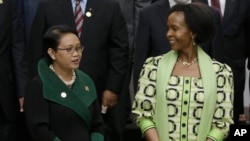On the second day of the Asian African Conference in Jakarta, Indonesia’s foreign ministers advocated for an independent Palestinian state and promised that the summit will produce a unified political message. But improving economic ties is the top priority for many of the delegates, especially in Africa where development has lagged behind Asia.
High ranking ministers from over 70 participating countries in Asia, Africa and the Middle East gathered in Jakarta for the second day of the Asian African Conference.
The weeklong summit and commemoration seeks to revive ties among developing countries that first came together in Indonesia 60 years ago at the historic Bandung Conference.
Palestinian issue
In her opening remarks, Indonesia’s Foreign Affairs Minister Retno Marsudi noted that support for independence from colonialism was the cause that united these countries in 1955. At this year’s conference she says Indonesia wants to make independence for the Palestinian territories controlled by Israel, a similar unifying cause.
“An issue that also merits out continued support and attention is the issue of Palestine. Indonesia remains steadfast in its unwavering support for an independent Palestine within the context of the two state solution,” she said.
The Palestinian Foreign Minister Riyad Malki also addressed the conference Monday. He pressed the delegates to consider a new push for full membership for Palestine at the United Nations and to put economic pressure on Israel.
“We should start talking about sanctions being imposed on Israel for violating international law and for negating the Palestinians basic rights,” he said.
The United Nations General Assembly voted in 2012 to grant Palestine Non-Member Observer State status in the UN. A proposal for setting a deadline for granting Palestinian region statehood later failed to pass the UN Security Council.
Economic development, trade
While there may be broad support for Palestinian statehood at the conference, many African delegates have come to Jakarta seeking better trade ties. So far there has been much talk about “South, South” and “Triangular” cooperation. These are terms that refer to how emerging countries like Indonesia either provide direct aid or with advanced countries provide assistance to less developed countries. But there have been few specifics offered as to what kind of programs they are talking about and how much monetary support might be offered.
Samori Ang’wa Okwiya, Kenya’s High Commissioner to Indonesia, Philippines and Brunei, says details will be forthcoming this week.
“We are looking at very new areas of interest. I can’t really go into details right now but I am sure at the end of the summit we will be able to come up with very concrete resolutions that are going to affect the cooperation between Asia and Africa,” said Okwiya.
Sidelines talks
Some delegates say the bilateral talks happening on the sidelines are just as important as the main conference in making trade and development deals between African and Asian countries.
Berhane Gebre-Christos, a high ranking ambassador with Ethiopia’s Ministry of Foreign Affairs, is optimistic after meeting with his Indonesian counterpart.
“We’re going to work on details but the potentials are huge for agriculture, for labor intensive enlistment like textiles, oil, name it,” he said.
Tuesday heads of state from China, Japan, South Africa, Ethiopia and Pakistan are scheduled to address the conference. And on Friday a number of heads of state will travel to Bandung to re-enact a historical procession that was part of the first conference 60 years ago.





